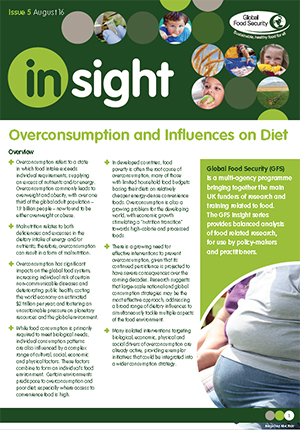How can we help people make better dietary choices for their health and the planet? The Global Food Security programme’s Sian Williams introduces a new report.

Switching on the news on 1 April can be a minefield – this year the global news headlines were dominated by just one story – there are now more adults in the world classified as obese than underweight.
Unfortunately, this was no April fool.
This shocking statistic came from a study led by scientists from Imperial College London. They found that between 1975 and 2014 the incidence of obesity more than doubled in women and tripled in men.
That means we’re now tipping the scales at more than 641 million people obese globally, and seeing the chances of achieving the WHO global obesity target vanish if current trends continue.
Overconsumption is taking its toll. As well as putting unsustainable pressure on an already strained global food system, it has also been suggested that chronic disease resulting from excessive diets accounts for £5Bn of annual NHS spend (PDF) and costs the wider UK economy more than £40Bn per year.
Who controls consumption?
When I first set out writing the Global Food Security programme Insight: Overconsumption and Influences on Diet (see below), I had not anticipated what a controversial topic overconsumption would be, even its definition.

Insight, issue five: Overconsumption and influences on diet
GFS Insight aims to offer a balanced and interdisciplinary representation of the current state of knowledge in a particular area relating to food security. This issue outlines the global impacts of overconsumption, exploring the varied range of dietary influences that lead to overconsuming and potential interventions for prevention.
(You can view PDF documents by downloading a PDF reader. We recommend using Google Chrome or Mozilla Firefox web browsers.)
In a formal sense, overconsumption refers to a state in which food intake exceeds individual food requirements, providing an excess of nutrients and energy. One major area of disagreement is whether overconsuming can result in malnutrition in the same way that hunger and under-nutrition can. It may not be completely intuitive, but according to the WHO, malnutrition encompasses excesses as well as deficiencies in nutrient and energy consumption, so can result from over as well as undereating.

The other area of contention concerns the root causes of overconsumption. Newspapers and magazines repeatedly adopt a blame culture, suggesting that what you consume is all down to personal choice. If you want to consume less or eat healthier then you just should. Simple.
However, research suggests that regulating our own consumption is not straightforward. Our physiology and psychology do play a big part in guiding what we eat, but in reality the factors that influence what and how much we eat are far more complex.
Economic drivers dictate the foods we are able to afford, eating in or out. Local food infrastructure impacts access to different kinds of food outlets. Personal and public transport widens or limits the range of choices within our reach. Social and cultural norms dictate what a normal diet and consumption pattern should look like, combining with our heritage and upbringing in how we were taught to eat.
This collective economic, physical and sociocultural context in which consumers make dietary choices is also known as the ‘food environment’, and is thought to be the most powerful influence on dietary behaviour. Some food environments have been shown to predispose to overconsumption and obesity; for example, more deprived neighbourhoods often have greater access to takeaway outlets and convenience stores. Healthy consumption in these environments clearly requires more than just good intentions and a stoic power of will.
Overconsumption and food security
Another complicating factor in developed countries like the UK is that a disproportionately greater incidence of overconsumption, being overweight or obese is seen more in the poorest groups within society facing food poverty.
Food poverty, closely associated to food insecurity, is described as the inability of individuals or households to obtain an adequate and nutritious diet, often because they cannot afford or easily access healthy food.

With food bank usage in the UK hitting record highs in 2016, household food budgets are clearly not stretching far enough. So it is unsurprising that more and more people are basing their diets on relatively cheaper convenience foods. These energy-dense options supply filling and affordable meals, but at the same time greater than the recommended calorie, fat, sugar and salt intake, and are lacking in micronutrients.
While such diets are by no means exclusive to those experiencing food poverty, the access restrictions faced by the poorest in society give them little opportunity to improve their dietary quality. This further propagates health and social inequalities between socio-economic groups.
How can we prevent overconsumption?
Overconsumption needs to stop. But what can we do to prevent it?
Despite that fact that many interventions aimed at moderating consumption and influencing healthy diets are already active across the globe – economic incentives such as soda, sugar and fat taxes; regulation on ‘junk food’ advertising to children; reformulation of many of our favourite snacks to cut calories, fat, salt or sugar; or socio-cultural campaigns such as Change4Life and 5-a-day in the UK – on average, the number of those overconsuming to become overweight or obese continues to grow.

Recent thinking suggests that isolated interventions will not be the answer to the overconsumption crisis.
The most effective strategies are thought to be those that combine a range of varied interventions, simultaneously targeting all the physical, economic and socio-cultural reasons behind overconsumption. This kind of approach would provide the greatest opportunity to transform food environments to support healthier choices – a key requirement in the challenge to improve diets and moderate consumption.
Add your comment, and follow Sian Williams on Twitter.
About Sian Williams
Sian studied Plant Sciences at the University of Cambridge before taking a Masters in Science Communication at Imperial College London. Sian is currently Analyst and Review Writer for the Global Food Security programme.



Thank you Sian,
While I appreciate that this is an awareness-raising skim on a complex topic, it’s good to see that there is an increasing number of messages on the subject.
Thanks very much for your comment Robert.
Influences on diet and consumption are certainly hugely complex, which in turn means solutions to the issues of over (and under) consumption and poor diet will be just as complex.
The Insight publication alongside this blog aims to give a comprehensive overview of current scientific knowledge surrounding consumption and influences on diet, strengthening the understanding we have on the topic as well as developing thinking on how best to address the associated issues.
Dear Sian,
Your publication “What are the intervention points
to reduce overconsumption?” is good. I have read this very a lot of interest.
I do not agree to your technological intervention points to reduce overconsumption. Such steps will have several side effect on health and nutrition. Your suggested interventions should have focused more on balance in traditional and instant food items,awareness on changing life style, timings of food intake, balance in indoor and outdoor entertainment etc. All these points you have discussed in the publication but are not clearly emerging out in the intervention section.
Thanks for your comment Abid, very glad you found the report of interest.
The section on interventions you mention was intended to give a flavour of the types of measures aiming to reduce overconsumption and improve diets that are already being used in the UK as well as in some other countries. I realise that the small selection of interventions covered will not fully address the issues presented by overconsumption and poor diet, but my primary aim here was to show that we are not starting from square one in addressing this huge challenge, and have the opportunity to build and improve on a great deal of existing work. It may also be worth pointing out that any formal evaluation of these measures was drawn on, but as this report is a review of existing literature it was not my intention to critique their efficacy further or suggest alternative interventions that are not yet being practically used.
I think the main message that should be taken from this Insight report is that in order to effectively create positive change, we will need to make use of a wide range of interventions targeting all aspects of the food environment simultaneously. To this end I certainly agree with you, as any such approach could include those interventions you mention, as well as a spread of the technical, economic, physical, social and cultural measures cited in the report. Of course an appropriate combination will be vital, and further work should be done to better understand outcomes and side effects of any groups of measures implemented.